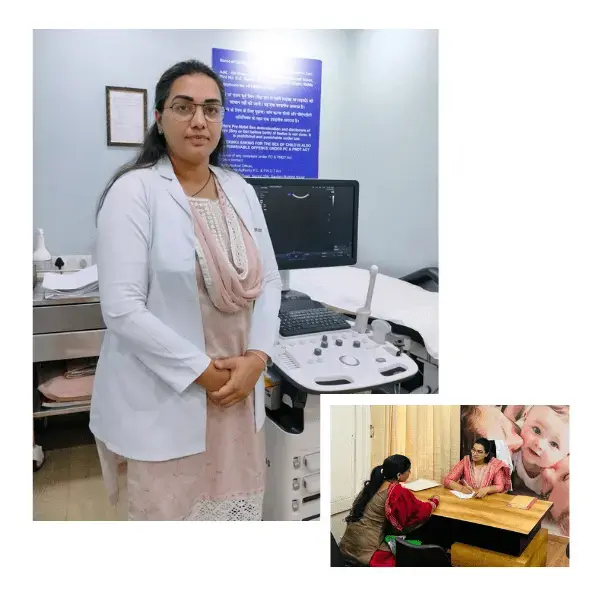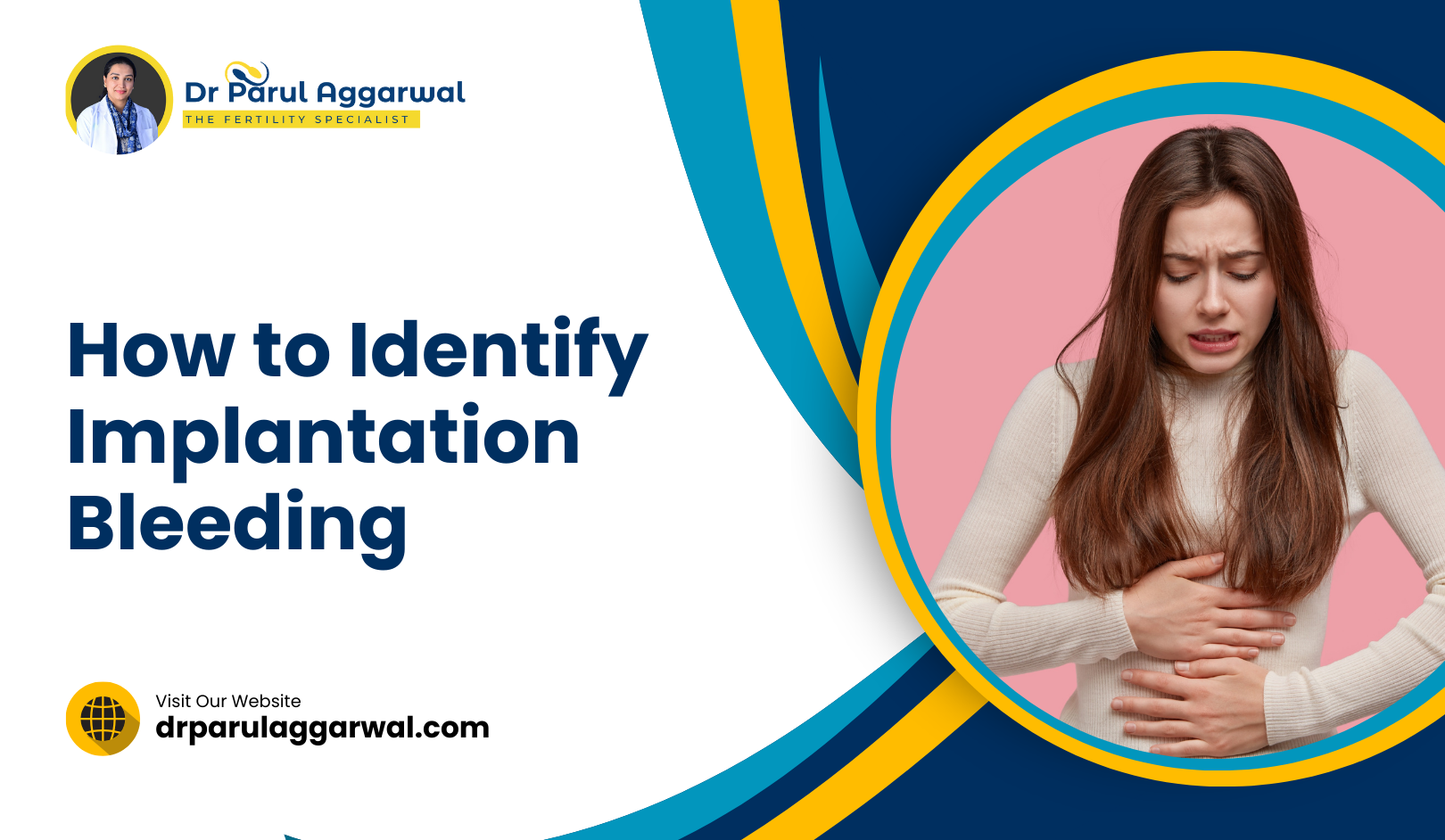

Dr Parul Aggarwal: Best Fertility Specialist in India
Over 10,000+ happy parents have placed their trust in Dr. Parul Aggarwal expertise to realize their parenthood dreams. With more than 25+ years of unwavering commitment to fertility, she stands out as a globally acclaimed infertility specialist and a pioneer in IVF treatment in Noida. Her recognition as one of the best IVF doctors in Noida underscores her exceptional skill and dedication to helping couples achieve successful outcomes. Dr. Parul approach combines advanced reproductive technologies with compassionate care, making her a beacon of hope for many seeking fertility solutions.
Consult NowBest Infertility Treatment in Noida

Fertility Testing
Assess your reproductive health with thorough fertility testing

Genetic Testing
Genetic testing reveals inherited conditions, guiding treatment choices.

Infertility Treatment
Unlock comprehensive solutions to overcome infertility and realize your dreams of parenthood.

Fertility Preservation
Secure your fertility for the future with cutting-edge preservation techniques.
We are here to acheive your parenthood dreams
Advanced Technology and Expertise
Benefit from advanced reproductive technology and a team of highly experienced specialists dedicated to your success.
Comprehensive Care and Support
Receive tailored treatment plans and holistic support, including emotional counseling and nutritional guidance, throughout your journey.
High Success Rates & Satisfaction
Join our many satisfied patients who have successfully achieved their parenthood dreams thanks to our high success rates and compassionate care.

Our Specialities
Our IVF and fertility services are designed with a focus on personalized care, advanced technology, and a compassionate approach to help you achieve your dream of parenthood.
Globally Recognized Fertility Experts in India

Publication
Member
Speaker






Dr. Parul Changed Our Lives: Real Stories from Patients
Book an AppointmentOur Success Story



Find Best Fertility Clinics Near You

Ferty Nest Noida
Block- 3F, Peacock Court, 21 S, Wave City Center, Sector 32, Noida, Uttar Pradesh 201301

Ferty Nest Karnal
1541, Main Road, Urban Estate, Sector 13, Karnal, Haryana 132001

Ferty Nest Delhi
World infertility & IVF centre , Building NO 13, 2 nd floor, Main Ring Road, Lajpat Nagar 4, New Delhi
Latest blog
Learn some new info from
our latest news
How Frozen Eggs Can Be Used for Future Pregnancy
In recent years, the idea of egg freezing has gained significant attention as more women choose to delay pregnancy for personal, professional, or medical reasons. This empowering reproductive technology allows women to preserve their fertility, giving them the flexibility to start a family when the time is right. Once eggs are frozen, they remain viable for many years, waiting to be used when you are ready for motherhood. But how exactly are frozen eggs used for future pregnancy? In this article, we’ll explore the step-by-step process of how frozen eggs can be used for a successful pregnancy, the role of fertility treatments like in vitro fertilization (IVF), and what women should expect when it comes to thawing and fertilizing their frozen eggs. With expert insights from Dr. Parul Aggarwal of Ferty Nest, we will demystify the process and provide guidance for women considering egg freezing or preparing to use their frozen eggs in the future. Understanding the Egg Freezing Process Before diving into how frozen eggs are used for pregnancy, let’s take a brief look at the egg freezing process. Egg freezing involves retrieving mature eggs from a woman’s ovaries, freezing them using a technique called vitrification, and storing them in a cryopreservation facility until they are needed. Vitrification is a rapid freezing method that prevents ice crystal formation, preserving the eggs in a near-perfect state. Frozen eggs can be stored for several years without any significant decline in quality, making this option ideal for women who wish to preserve their fertility. Women choose to freeze their eggs for various reasons, including: Delaying pregnancy for career or personal reasons. Medical conditions such as cancer, where treatments may affect fertility. Risk of premature ovarian failure or early menopause. Once the woman is ready to become pregnant, her frozen eggs are thawed, fertilized, and implanted to achieve pregnancy. Step-by-Step: How Frozen Eggs Are Used for Future Pregnancy When the time comes to use frozen eggs, the process typically involves IVF (in vitro fertilization). Here’s how the journey unfolds: 1. Thawing the Frozen Eggs The first step in using frozen eggs is the thawing process. Frozen eggs are carefully thawed in a controlled laboratory environment by embryologists. Not all eggs may survive the thawing process, but advancements in vitrification have significantly improved survival rates. What to Expect: On average, about 80-90% of eggs survive the thawing process. The thawed eggs are closely monitored for quality and health before proceeding to the next step. 2. Fertilization of Thawed Eggs Once the eggs are successfully thawed, the next step is fertilization. In most cases, the fertilization process is done using a specialized technique called Intracytoplasmic Sperm Injection (ICSI), where a single sperm is directly injected into each egg. This method increases the chances of successful fertilization, especially when frozen eggs are used. Why ICSI is Commonly Used: Frozen eggs have a slightly harder outer shell, and ICSI ensures that the sperm penetrates the egg effectively. It increases the likelihood of fertilization, particularly for women with male partners experiencing fertility issues or using donor sperm. 3. Embryo Development After fertilization, the fertilized eggs (now embryos) are cultured in the laboratory for several days. During this time, the embryos are monitored for their growth and development. The embryologists evaluate the quality of the embryos, identifying which ones are suitable for implantation. What Happens During This Stage: Embryos are observed for 3-5 days to reach the blastocyst stage, which is considered ideal for implantation. The healthiest embryos are selected for transfer, while others can be frozen for future use if desired. 4. Embryo Transfer Once the embryos have reached the desired stage of development, one or more embryos are transferred to the woman’s uterus in a simple and minimally invasive procedure called embryo transfer. This procedure typically takes only a few minutes and does not require anesthesia. What to Expect During Embryo Transfer: The embryos are placed into the uterus using a thin catheter. The procedure is painless and usually done in a fertility clinic. After the transfer, the woman may be advised to rest for a short period before returning to her daily activities. 5. Pregnancy Testing Approximately 10 to 14 days after the embryo transfer, a pregnancy test is conducted to determine whether the embryo has successfully implanted in the uterine lining. This can be done via a blood test or a home pregnancy test. If the pregnancy test is positive, the pregnancy proceeds as usual, with regular monitoring by your doctor. Key Points: It is important to maintain a healthy lifestyle during this time to support embryo implantation. If the test is positive, further ultrasounds will be scheduled to confirm the pregnancy and monitor its progress. Success Rates and What to Expect While egg freezing offers an incredible opportunity to preserve fertility, it’s important to understand that the process, like any fertility treatment, does not guarantee a pregnancy. However, the success rates of using frozen eggs have significantly improved with advancements in technology, particularly with the use of vitrification and ICSI. Factors Affecting Success Rates: Age at the time of egg freezing: Younger women tend to have better-quality eggs, which leads to higher success rates. Women who freeze their eggs in their 20s or early 30s generally have a higher chance of success compared to those who freeze their eggs later in life. Number of eggs frozen: The more eggs frozen, the higher the likelihood that some will survive the thawing and fertilization process. Overall health: The woman’s reproductive health and uterine environment play a significant role in the success of embryo implantation. At Ferty Nest, Dr. Parul Aggarwal and her team provide personalized fertility care to ensure that every step of the egg freezing and thawing process is optimized for success. With comprehensive support and guidance, our goal is to help you achieve a successful pregnancy when you are ready to use your frozen eggs. Emotional Considerations and Support Deciding to use frozen eggs for pregnancy can be an emotional journey. Many women feel a mix of excitement and anxiety, especially when waiting for the outcome of embryo transfer and pregnancy testing. At Ferty Nest, we recognize the emotional impact of fertility treatments and provide holistic support throughout the process. Support Services Include: Counseling: Emotional support and counseling are available to help you navigate the psychological aspects of using frozen eggs. Comprehensive Care: Our team offers ongoing care, answering any questions you may have and providing reassurance along the way. Conclusion: Take Control of Your Fertility with Ferty Nest Egg freezing has revolutionized fertility preservation, giving women the power to choose when to become mothers. When you’re ready to use your frozen eggs, the process is straightforward and can lead to a healthy, successful pregnancy with the help of IVF. Dr. Parul Aggarwal and her expert team are here to guide you through every step, from thawing your frozen eggs to welcoming a new addition to your family. If you’re considering egg freezing or are ready to use your frozen eggs for pregnancy, contact Ferty Nest today to schedule a consultation and learn more about your fertility options.
Infertility Specialist in Karnal
Infertility can be one of the most challenging and emotional journeys for couples who dream of starting a family. The good news is that advancements in medical science have made it possible for many couples to overcome infertility and achieve their goal of parenthood. If you’re in Karnal and looking for an experienced, compassionate, and dedicated infertility specialist, Dr. Parul Aggarwal is here to guide you through every step of your fertility journey. With years of experience and a proven track record in treating a wide range of infertility issues, Dr. Parul Aggarwal has become a leading name in fertility care. As a specialist who deeply understands the emotional and physical challenges that come with infertility, she provides personalized, cutting-edge treatments with the utmost care and compassion. Best Infertility Specialist in Karnal Dr. Parul Aggarwal is an accomplished fertility expert with extensive training in reproductive medicine. She is known for her compassionate approach, personalized care plans, and the use of advanced technology to help couples achieve successful pregnancies. Dr. Aggarwal’s commitment to staying updated on the latest fertility treatments ensures that her patients receive the most effective and innovative care available. Her expertise spans various fertility treatments, including In Vitro Fertilization (IVF), Intrauterine Insemination (IUI), Intracytoplasmic Sperm Injection (ICSI), and other assisted reproductive techniques, making her a highly trusted infertility specialist in Karnal. Common Causes of Infertility Infertility can be caused by a variety of factors, both in men and women. Understanding the underlying cause of infertility is key to developing an effective treatment plan. Here are some common causes of infertility that Dr. Parul Aggarwal diagnoses and treats: 1. Ovulatory Disorders Ovulatory disorders are one of the most common causes of infertility in women. These include conditions such as Polycystic Ovary Syndrome (PCOS), which affects hormone levels and interferes with ovulation. Dr. Aggarwal offers targeted treatments to help regulate ovulation and improve fertility. 2. Blocked Fallopian Tubes Blocked or damaged fallopian tubes prevent the sperm from reaching the egg, making natural conception difficult. Tubal blockages can be caused by infections, endometriosis, or previous surgeries. Dr. Aggarwal specializes in treating such cases through advanced fertility treatments like IVF. 3. Male Infertility Male infertility accounts for nearly half of all infertility cases. Issues such as low sperm count, poor sperm motility, or abnormal sperm shape can affect a couple’s ability to conceive. Dr. Parul Aggarwal offers specialized treatments like ICSI, where a single sperm is directly injected into the egg to improve the chances of fertilization. 4. Unexplained Infertility In some cases, the cause of infertility may remain unknown despite extensive testing. This is known as unexplained infertility. Dr. Aggarwal approaches such cases with customized treatment plans that focus on maximizing fertility through techniques like IUI or IVF. 5. Endometriosis Endometriosis is a condition where tissue similar to the uterine lining grows outside the uterus, causing pain and fertility issues. Dr. Aggarwal offers both surgical and medical treatments to help women with endometriosis conceive. Fertility Treatments Offered by Dr. Parul Aggarwal Dr. Parul Aggarwal offers a wide range of fertility treatments designed to address specific causes of infertility and increase the chances of a successful pregnancy. Here are some of the most common treatments available at her clinic: 1. In Vitro Fertilization (IVF) IVF is one of the most successful fertility treatments available today. During the IVF process, eggs are retrieved from the ovaries and fertilized with sperm in a laboratory. The resulting embryos are then transferred to the uterus for implantation. Dr. Parul Aggarwal’s IVF treatment plans are personalized to each patient’s unique needs, utilizing advanced techniques such as blastocyst culture and preimplantation genetic testing (PGT) to improve success rates. 2. Intrauterine Insemination (IUI) IUI is a less invasive fertility treatment where sperm is directly placed into the uterus during ovulation. This procedure is often used for couples with mild male infertility or unexplained infertility. Dr. Aggarwal’s experience with IUI helps couples increase their chances of conceiving without undergoing more intensive procedures. 3. Intracytoplasmic Sperm Injection (ICSI) For couples dealing with severe male infertility, ICSI can be an effective solution. This procedure involves injecting a single healthy sperm directly into the egg, increasing the likelihood of fertilization. Dr. Parul Aggarwal uses ICSI in cases where sperm count or quality is low, helping many couples achieve successful pregnancies. 4. Fertility Preservation (Egg/Sperm Freezing) For individuals who wish to delay parenthood for medical or personal reasons, fertility preservation through egg or sperm freezing is an excellent option. Dr. Aggarwal offers advanced cryopreservation techniques that allow individuals to store their eggs or sperm for future use, ensuring their fertility is preserved. 5. Ovulation Induction For women with ovulatory disorders, Dr. Parul Aggarwal offers ovulation induction treatments. This involves using medications to stimulate the ovaries and promote the release of eggs, making conception more likely. 6. Donor Programs Dr. Aggarwal also offers donor programs for couples who require donor eggs or donor sperm to conceive. These programs are conducted with the highest ethical standards, ensuring that couples receive healthy donor eggs or sperm from trusted sources. Why Choose Dr. Parul Aggarwal? Choosing the right infertility specialist is critical to your fertility journey. Here’s why Dr. Parul Aggarwal is the top choice for couples seeking fertility treatments in Karnal: 1. Expertise in Fertility Treatments With years of experience and a deep understanding of the latest reproductive technologies, Dr. Parul Aggarwal offers comprehensive fertility treatments that are tailored to each patient’s needs. Her approach to fertility care combines advanced techniques with personalized care to optimize success rates. 2. Compassionate and Personalized Care Infertility is a sensitive and emotional issue for many couples. Dr. Aggarwal understands the challenges her patients face and offers compassionate, personalized care throughout their fertility journey. She takes the time to listen to each patient’s concerns, ensuring that they feel supported and informed at every step. 3. Cutting-Edge Technology Dr. Parul Aggarwal’s clinic is equipped with state-of-the-art technology, ensuring that all fertility treatments are performed using the latest advancements in reproductive medicine. From IVF labs to cryopreservation facilities, every aspect of the clinic is designed to deliver the highest quality care. 4. High Success Rates Dr. Aggarwal’s track record of successful pregnancies speaks for itself. With a focus on individualized treatment plans and cutting-edge techniques, her clinic has helped countless couples achieve their dream of parenthood. 5. Ethical and Transparent Approach At Dr. Parul Aggarwal’s clinic, transparency and ethical practices are at the heart of every treatment. She ensures that her patients are fully informed about their treatment options, potential outcomes, and costs, providing complete transparency throughout the process. Conclusion: Trust Dr. Parul Aggarwal for Expert Fertility Care in Karnal If you’re struggling with infertility and seeking the expertise of a trusted fertility specialist in Karnal, Dr. Parul Aggarwal is here to provide you with the guidance, support, and treatment you need. With her compassionate approach, personalized treatment plans, and advanced fertility solutions, Dr. Aggarwal has helped countless couples overcome infertility and realize their dream of parenthood. Contact Dr. Parul Aggarwal today to schedule a consultation and take the first step toward building your family.
How to Identify Implantation Bleeding : Causes, Symptoms
One of the earliest signs of pregnancy that can be confusing for many women is implantation bleeding. This subtle yet significant event occurs when a fertilized egg attaches itself to the lining of the uterus, marking the first step in pregnancy. However, because implantation bleeding can resemble light spotting or a menstrual period, it often leaves women wondering whether it is an early sign of pregnancy or just a regular period. In this article, we’ll help you understand how to identify implantation bleeding, the causes behind it, common symptoms, and what to expect if you experience it. As a fertility specialist, Dr. Parul Aggarwal offers insights to guide you through this exciting but sometimes confusing stage of early pregnancy. What is Implantation Bleeding? Implantation bleeding happens when the fertilized egg, or embryo, travels through the fallopian tube and implants itself into the uterine lining. This occurs around 6 to 12 days after ovulation and fertilization. As the embryo burrows into the uterus, it may cause slight damage to the blood vessels in the uterine lining, resulting in light bleeding or spotting. Implantation bleeding is considered one of the earliest signs of pregnancy and often occurs around the time when you might expect your next menstrual period. This can lead to confusion for women who may mistake it for a lighter-than-usual period. Causes of Implantation Bleeding Implantation bleeding occurs as a natural part of the early pregnancy process. Here’s what happens: Fertilization: After ovulation, sperm meets the egg in the fallopian tube, leading to fertilization. Embryo Development: The fertilized egg begins to divide and grow, forming a blastocyst. Travel to the Uterus: The blastocyst travels through the fallopian tube to reach the uterus. Implantation: The blastocyst attaches to the uterine wall, causing a slight disruption to the blood vessels, which may result in light bleeding. It’s important to note that implantation bleeding is harmless and a completely normal part of early pregnancy. However, not all women experience implantation bleeding, and its absence doesn’t mean you’re not pregnant. Symptoms of Implantation Bleeding To help you identify whether the bleeding you’re experiencing is due to implantation, here are some common symptoms: 1. Timing of the Bleeding Implantation bleeding usually occurs around 6 to 12 days after ovulation, or about a week before your expected period. If you’re experiencing light spotting at this time and you’ve had unprotected intercourse, there’s a chance it could be implantation bleeding. 2. Light Spotting Unlike a menstrual period, which typically starts light and becomes heavier, implantation bleeding is usually very light. It often appears as a few drops of blood or light spotting. It’s typically pink, light red, or brown in color, rather than the bright red blood seen during a period. 3. Short Duration Implantation bleeding typically lasts anywhere from a few hours to 2 days. In contrast, a menstrual period can last 3 to 7 days. If the bleeding stops quickly, it’s more likely to be implantation bleeding than a period. 4. No Clotting While some women experience clotting during their period, implantation bleeding does not usually involve blood clots. It’s more of a light, steady spotting. 5. Mild Cramping Some women experience mild cramping during implantation bleeding, though it’s typically lighter than menstrual cramps. If you feel a slight discomfort around the time of spotting, it could be due to the embryo attaching to the uterine lining. 6. No Accompanying PMS Symptoms Menstrual periods are often accompanied by premenstrual symptoms such as bloating, breast tenderness, fatigue, and mood swings. Implantation bleeding, on the other hand, is usually not associated with these symptoms, or they are much milder. How to Differentiate Between Implantation Bleeding and a Period Because implantation bleeding can occur around the time of your period, it’s essential to know the differences between the two: Implantation Bleeding Menstrual Period Light spotting or pink/brown discharge Typically heavier, with bright red blood Lasts a few hours to 2 days Lasts 3 to 7 days No clots present Clots may be present Occurs 6 to 12 days after ovulation Occurs 14 days after ovulation Accompanied by mild cramping (if any) May involve moderate to severe cramps No typical PMS symptoms May involve bloating, mood swings, fatigue, etc. If you’re unsure whether the bleeding is implantation bleeding or your period, consider other early signs of pregnancy, such as nausea, fatigue, and breast tenderness. A home pregnancy test can provide clarity, but it’s best to wait at least a few days after the bleeding stops to take it, as implantation bleeding occurs before hCG levels (pregnancy hormone) are detectable. What Should You Do If You Experience Implantation Bleeding? If you suspect you’re experiencing implantation bleeding, it’s important to: Track the Timing: Note when the spotting occurs and how long it lasts. Compare this to your usual menstrual cycle. Monitor Symptoms: Pay attention to any early pregnancy symptoms, such as nausea, fatigue, or tender breasts. Take a Pregnancy Test: Wait a few days after the bleeding stops before taking a home pregnancy test. It’s best to take the test at least a day or two after your missed period for the most accurate result. If you receive a positive pregnancy test result or have any concerns about your bleeding, it’s a good idea to consult your doctor for further guidance. When to Seek Medical Advice Although implantation bleeding is generally harmless, it’s essential to know when to seek medical advice. If the bleeding becomes heavy, lasts longer than a few days, or is accompanied by severe cramping, you should consult your healthcare provider. Heavy bleeding could be a sign of other conditions, such as miscarriage or an ectopic pregnancy, which require medical attention. Conclusion: Understanding Implantation Bleeding with Dr. Parul Aggarwal Implantation bleeding is an exciting early sign of pregnancy that occurs when a fertilized egg attaches to the uterine lining. While it’s easy to confuse this light spotting with a menstrual period, paying attention to the timing, color, and amount of bleeding can help you identify it as implantation bleeding. Dr. Parul Aggarwal and her team are dedicated to helping women understand every aspect of their fertility journey, from early pregnancy signs to fertility treatments. If you have questions about implantation bleeding, fertility, or pregnancy, don’t hesitate to contact Dr Parul for expert advice and compassionate care. Let us support you every step of the way on your journey to parenthood.













